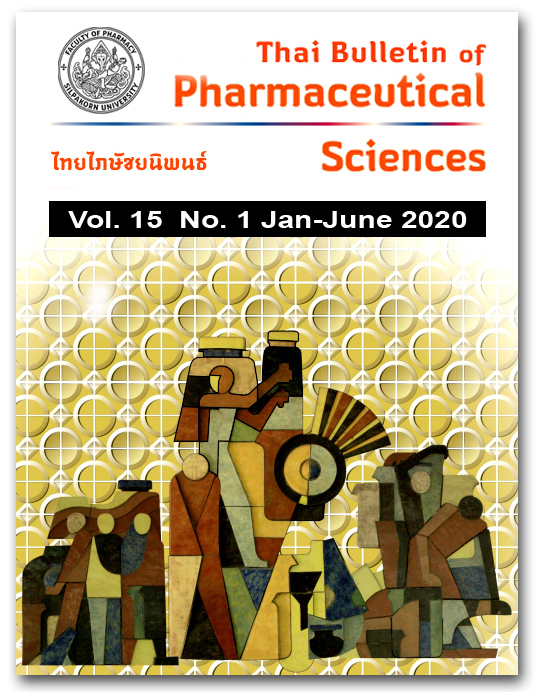ASSESSMENT OF PATIENT’S UNDERSTANDING AND MEDICATION ADHERENCE FOR LABELS ACCORDING TO RATIONAL DRUG USE HOSPITAL PROJECT
DOI:
https://doi.org/10.69598/tbps.15.1.129-144Keywords:
label, rational drug use hospital project, understanding, recall, medication adherenceAbstract
The objectives of this study were to assess patients’ understanding, recall and medication adherence of labels according to the Rational Drug Use (RDU) hospital project developed by the University Hospital Network (UHosNet), Thailand, in comparison with the former format of hospital’s labels. This study was an experimental design and consisted of 2 parts. The first part focused on understanding RDU labels for acute illness medication (153 patients in the study group and 153 patients in the control group). The second part focused on understanding RDU labels, recall and medication adherence for chronic disease medicines (60 patients in the study group and 60 patients in the control group). The results showed that in acute illness and chronic disease medication, the study group was significantly better at understanding generic names than the control group (p<0.001), but had a significantly less understanding of the need for taking medication with meals than the control group (p<0.001). In terms of recalling information on labels of chronic disease medication, the labels were divided into 2 categories: 1. started/adjusted medications and 2. non-adjusted medications. The study group had a significantly better recall of generic names than the control group did in categories 1 (p=0.026), but had a significantly less recall of the need for taking medicines with meals than the control group in both categories 1 (p=0.031) and categories 2 (p<0.001). The study group and the control group were not significantly different in adherence to medications (p>0.05). In conclusion, the data obtained from this study should lead to the improvement of labels according to the RDU hospital project which should specify the generic name of the medications and how to take the medication in relation to the meals. If any type of medication is not related to the meals, the labels should state the message "This medicine is not required to be taken with meals". It would help patients better understand drug administration and may result in better medication adherence.
References
Lokker N, Sanders L, Perrin EM, Kumar D, Finkle J, Franco V, et al. Parental misinterpretations of over-the-counter pediatric cough and cold medication labels. Pediatrics. 2009;123(6):1464-71.
The Sub-committee on Rational Drug Use Promotion. Rational drug use hospital manual. Bangkok: The Agricultural Co-operative Federation of Thailand Printing House; 2015. (in Thai)
The Sub-committee on Rational Drug Use Promotion. Recommend for improve rational drug use hospital labels [internet]. Bangkok: National Health Security Office (NHSO); 2015 [cited 2018 Jan 8]. Available from: www.lpnh.go.th/drug/file/RDULabelGuideline.pdf. (in Thai)
Tantai N. Drug labels and the needs of people. Presented at: 17th HA National Forum; 2016 Mar 8-11; Bangkok, Thailand. (in Thai)
Jampasa N, Muenpa R, Chanadee S. Understanding and satisfaction in drug labeling according to rational drug use hospital project of non communicable disease patients. Isan J Pharm Sci. 2017;13(1 suppl.):724-34. (in Thai)
Wisetsing C. Compare understanding of conventional labels and RDU labels by patients with NCDs at Lampang Hospital. Presented at: Ministry of Public Health Academic Meeting; 2017 Sep 6-8; Udon thani, Thailand. (in Thai)
Sthapornnanon N. Medical non adherence. Thai Bull Pharm Sci (CPE). 2012;7:23-39. (in Thai)
Limcharoen N, Wanishayakorn T, Lerkiatbundit S. Effects of pictograms on how to take oral tablets in illiterate Thai Muslim patients. Thai J Pharm Pract. 2017;9(2):294-306. (in Thai)
Jongwilaikasem K. Development of medication adherence scale in Thais [master’s thesis]. Songkla: Prince of Songkla University; 2019. (in Thai)
Suphachamroon A, Lerkiatbundit S, Saengcharoen W. Validity and reliability of the medication adherence scale in Thais (MAST): testing in diabetes patients. Thai J Pharm Pract. 2018;10(2):607-19. (in Thai)
Osterberg L, Blaschke T. Drug therapy adherence to medication. N Engl J Med. 2005;353(5):487-97.
Sumpradit N. Antibiotic smart use. HITAP. 2009;2(7):3-4. (in Thai)
Mongkolchaipak J, Ruamsuk J, Chaiprateep A. The study of customer’s knowledge and behavior in using antibiotics at community drug store in Pathum Thani Province. EAU Herit J. 2012;6(2):91-100. (in Thai)
Darunthanom W, Utaipiboon C, Tangchitphisut P. Medication use adherence and behaviors among elderly patients with chronic diseases in Tambon Hua Ngom, Phan District, Chiang Rai Province. Chiangrai Med J. 2019;11(1):19-27. (in Thai)
Rungsawan S. Factor related to polypharmacy medication adherence among older persons with chronic illness [master’s thesis]. Bangkok: Chulalongkorn University; 2015. (in Thai)
Wongwatanarot A, Lueangchiranothai P, Kanitpanyacharoen M. The result of adding the drug name and properties of the drug to Thai in the drug label for known of the medicine name and medication adherence of diabetic patients. Lampang Med J. 2014;35(1):20-8. (in Thai)
Chaichanawirote U, Vithayachockitikhun N. Medication use behaviors among older Thai adults. J Nurs Health Sci. 2015;9(1):32-46. (in Thai)
Wolf MS, Davis TC, Curtis L, Bailey SC, Knox JP, Bergeron A, et al. A patient-centered prescription drug label to promote appropriate medication use and adherence. J Gen Intern Med. 2016;31(12):1482-9.
Taengsakha K, Maneesriwongul W, Putawatana P. Factors related to adherence to treatment in essential hypertensive patients with early renal insufficiency. Rama Nurs J. 2019;25(1):87-101. (in Thai)
Wongyai S, Maneesriwongul W, Putawatana P. Factors related to medication adherence among patients with diabetes mellitus type 2 at diabetic clinic. BCN J Nurs. 2014;30(2):80-90. (in Thai)
Downloads
Published
How to Cite
Issue
Section
License
All articles published and information contained in this journal such as text, graphics, logos and images is copyrighted by and proprietary to the Thai Bulletin of Pharmaceutical Sciences, and may not be reproduced in whole or in part by persons, organizations, or corporations other than the Thai Bulletin of Pharmaceutical Sciences and the authors without prior written permission.



